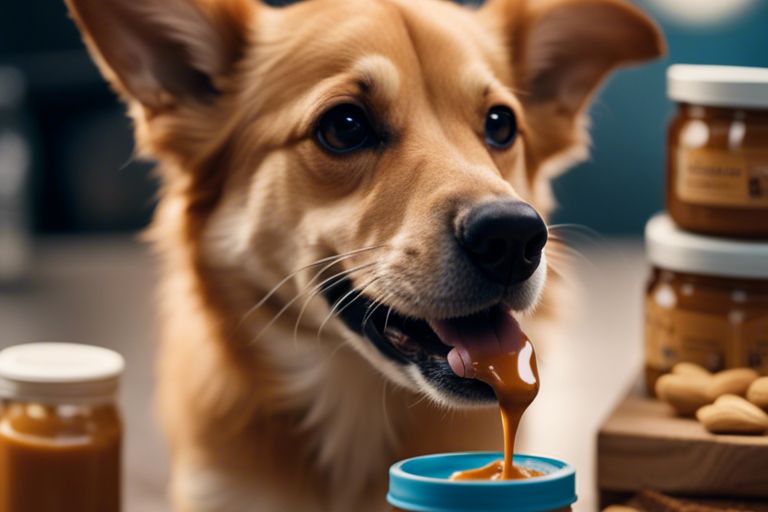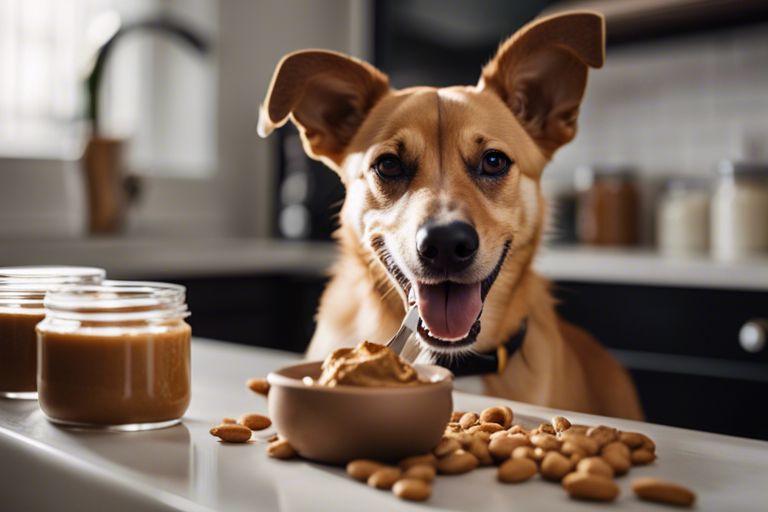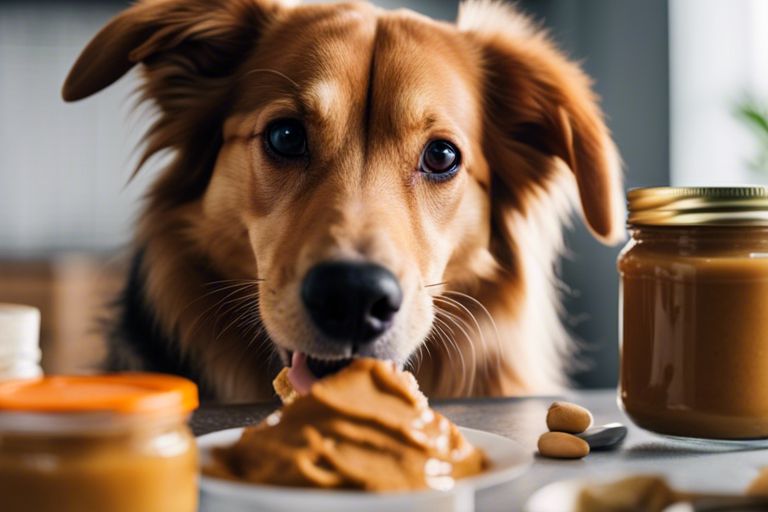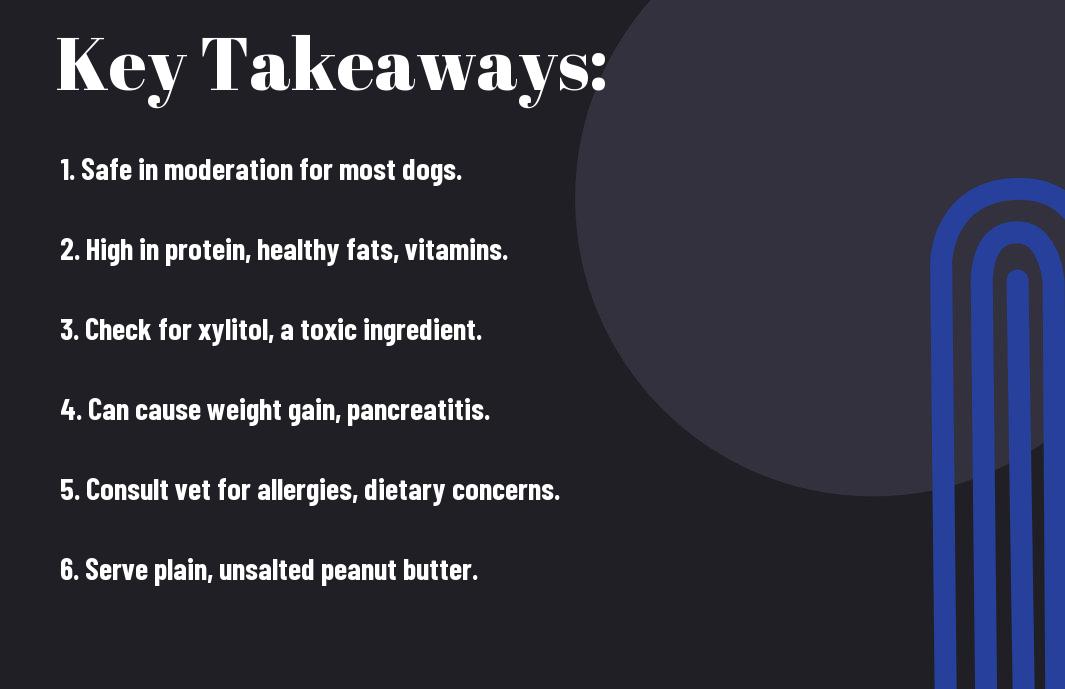Over the years, there has been much debate about whether peanut butter is a safe treat for our canine companions. In this informative blog post, we will explore into the potential benefits and risks of feeding peanut butter to dogs, exploring important factors such as ingredients, serving sizes, and any potential health concerns. By the end of this article, you will have a better understanding of whether peanut butter can be a healthy addition to your furry friend’s diet.
Key Takeaways:
- Peanut Butter as a Treat: Peanut butter can be a tasty and enjoyable treat for dogs when given in moderation.
- Benefits of Peanut Butter: Peanut butter can be a good source of protein, healthy fats, and vitamins for dogs.
- Avoid Harmful Ingredients: Always check the label and avoid giving dogs peanut butter with xylitol, a harmful sweetener for dogs.
- Use Peanut Butter Responsibly: Consider the calorie content of peanut butter when giving it to your dog to avoid weight gain.
- Consult with a Vet: If you have any concerns or questions about giving peanut butter to your dog, it’s best to consult with a veterinarian for advice.
The Nutritional Benefits of Peanut Butter
For 4 Dog Safe Peanut Butter Brands That Are Xylitol-Free, peanut butter is not only a tasty treat for dogs but also a source of valuable nutrients. One of the key nutritional benefits of peanut butter for dogs is its protein content.
Protein Content
Butter is a good source of plant-based protein for dogs. Protein is important for supporting muscle development and overall growth in dogs. By incorporating peanut butter into their diet, dogs can benefit from an extra protein boost to keep them strong and healthy.
Healthy Fats
The consumption of healthy fats is important for dogs’ skin and coat health, cognitive function, and energy levels. Peanut butter contains monounsaturated fats, which are considered beneficial for dogs’ heart health. These healthy fats can contribute to a shiny coat and promote overall well-being in dogs.
To ensure your dog receives the nutritional benefits of peanut butter, it is important to opt for varieties that are free from xylitol, a sweetener that can be toxic to dogs. Incorporating peanut butter into your dog’s diet in moderation can provide them with a tasty and nutritious snack option.
Can Dogs Digest Peanut Butter?
One of the most common questions dog owners have when it comes to feeding their furry friends peanut butter is, Can Dogs Eat Peanut Butter? The answer is generally yes, but there are some considerations to keep in mind regarding their digestion.
The Role of Enzymes
To properly digest peanut butter, dogs rely on enzymes in their digestive system. These enzymes help break down the fats, proteins, and nutrients in the peanut butter so that they can be absorbed and utilized by the body. Dogs produce different enzymes than humans, which means that their digestive systems may process peanut butter differently.
Potential Digestive Issues
One concern with feeding dogs peanut butter is the potential for digestive issues. While many dogs can enjoy peanut butter without any problems, some may experience gastrointestinal issues such as diarrhea, vomiting, or other discomfort. It’s crucial to monitor your dog after giving them peanut butter for any signs of digestive upset.
One important thing to consider is the fat content in peanut butter, which can be challenging for some dogs to digest. For instance, dogs with sensitive stomachs or a history of pancreatitis may not tolerate peanut butter well due to its high fat content. It’s always best to introduce new foods like peanut butter gradually and in small amounts to see how your dog reacts.
The Risks of Peanut Butter for Dogs
After examining the potential benefits of peanut butter for dogs, it’s important to also consider the risks associated with this popular treat. While peanut butter can be a tasty and nutritious snack for your canine companion, there are some potential dangers that pet owners should be aware of.
Xylitol Toxicity
Toxicity from xylitol, a sugar substitute commonly found in sugar-free peanut butter and other sugar-free products, is a significant risk for dogs. Xylitol can cause a rapid release of insulin in dogs, leading to hypoglycemia (low blood sugar), which can be life-threatening. Symptoms of xylitol poisoning in dogs include vomiting, lethargy, coordination problems, and seizures. It is crucial to always check the ingredients list of peanut butter before sharing it with your furry friend to ensure it does not contain xylitol.
Allergies and Intolerances
Dogs, like humans, can also have allergies or intolerances to certain foods, including peanuts. While peanut allergies in dogs are not as common as in humans, they can still occur. Symptoms of an allergic reaction to peanut butter in dogs may include itching, swelling, hives, and gastrointestinal upset. If you suspect your dog is having an allergic reaction to peanut butter, it’s best to consult your veterinarian for guidance.
For instance, if your dog has never had peanut butter before, it’s a good idea to start with a small amount and monitor for any adverse reactions. Additionally, if your dog has a known food allergy, it’s best to avoid feeding them peanut butter altogether to prevent any potential allergic reactions.
How Much Peanut Butter is Safe for Dogs?
Recommended Daily Amounts
All dogs are different, so it is important to consider your dog’s size and dietary needs when incorporating peanut butter into their diet. As a general guideline, veterinarians recommend that dogs can safely enjoy peanut butter in moderation. The recommended daily amount of peanut butter for dogs is typically around 1 teaspoon per 10 pounds of body weight. This can be used as a guide to ensure that your furry friend enjoys the treat without any negative health effects.
Monitoring for Adverse Reactions
Daily monitoring for adverse reactions is crucial when introducing any new food to your dog’s diet, including peanut butter. Be on the lookout for any signs of allergies, such as itching, swelling, or gastrointestinal upset. If you notice any adverse reactions, it’s best to consult your veterinarian immediately to determine the best course of action for your pet’s health and well-being.
Recommended monitoring involves observing your dog closely after they consume peanut butter for the first time, and over a few days as they enjoy this treat. While small amounts of peanut butter are generally safe for dogs, it’s always better to err on the side of caution and watch for any unexpected reactions.
Healthy Alternatives to Peanut Butter
SunButter and SoyButter
Not all dogs can tolerate peanut butter, so it’s vital to explore other options. With the rise in nut allergies, SunButter and SoyButter have become popular alternatives. These spreads are made from sunflower seeds and soybeans, making them a safe choice for dogs with nut allergies.
Banana and Pumpkin Purees
On the other hand, if you prefer natural and homemade treats for your furry friend, consider using banana and pumpkin purees as a healthy alternative to peanut butter. These fruits are not only safe but also packed with vital nutrients like potassium and fiber that can benefit your dog’s digestion and overall health.
For instance, bananas are a great source of energy, while pumpkin is known for its digestive benefits. Mixing these purees with your dog’s favorite treats or using them as stuffing for interactive toys can provide a delicious and nutritious alternative to peanut butter.
Peanut Butter as a Training Tool
Many dog owners are familiar with using peanut butter as a training tool for their furry companions. According to Can Dogs Eat Peanuts and Peanut Butter? it can be a tasty and motivating treat for dogs during training sessions. The creamy texture and richness of peanut butter make it a highly desirable reward for dogs, helping to reinforce good behavior during training.
Rewarding Good Behavior
Peanut butter can be an excellent way to reward your dog for good behavior during training sessions. Whether you are teaching them basic commands, practicing tricks, or working on obedience, a small taste of peanut butter can act as a delicious incentive for your furry friend. This positive reinforcement can help strengthen the bond between you and your dog while making the training experience more enjoyable for them.
Hiding Medication
With the strong aroma and flavor of peanut butter, it can also be used to hide medication for dogs who may be hesitant to take pills. Peanut butter’s sticky consistency allows you to easily conceal a pill within a dollop, making it more enticing for your dog to consume.
For instance, if your dog needs to take medication that they find unpleasant, simply hiding it in a spoonful of peanut butter can make the process much smoother. Be sure to consult your veterinarian to ensure that this method is appropriate for your dog’s specific medication and dosing requirements.
To wrap up
With this in mind, it is vital to approach feeding peanut butter to dogs with caution and consideration. While peanut butter can be a tasty treat for dogs in moderation, it is crucial to be mindful of potential risks such as allergies, choking hazards, and excessive fat intake. Always consult with a veterinarian before introducing peanut butter or any new food into your dog’s diet to ensure their health and well-being.
FAQ
Q: Can dogs eat peanut butter?
A: Yes, dogs can eat peanut butter as it is safe for them in moderation. It can be a good source of protein and healthy fats for your furry friend.
Q: Is peanut butter healthy for dogs?
A: Peanut butter can be a healthy treat for dogs when given in moderation. It is rich in protein, healthy fats, vitamins, and niacin, which can benefit your dog’s overall health.
Q: Are there any risks associated with feeding peanut butter to dogs?
A: While peanut butter is generally safe for dogs, it is important to watch out for added ingredients like xylitol, which is toxic to dogs. Also, be mindful of the portion size as excessive consumption can lead to obesity.
Q: How should I give peanut butter to my dog?
A: You can give peanut butter to your dog directly from a spoon, mix it into their food as a tasty topping, or use it in interactive toys like Kong to keep them entertained and mentally stimulated.
Q: What are the benefits of giving peanut butter to dogs?
A: Peanut butter can be a good source of energy, protein, and healthy fats for dogs. It can also serve as a tasty way to administer medication or supplements to your dog if they are reluctant to take them otherwise.
Are strawberries toxic for dogs
Demystifying Anal Gland Issues in Dogs: Your Comprehensive Guide from the American Kennel Club




